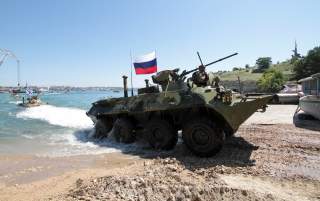As America Worries About China, Russia Eyes The South China Sea
A second great power is interested.
Key point: How will Beijing deal with Russian resource exploration with the Philippines and gas projects with Vietnam, all within its self-proclaimed waters?
In October, during his second official visit to Russia, Philippine President Rodrigo Duterte invited Moscow-based energy company Rosneft to conduct oil and gas exploration in waters the Philippines claims in the South China Sea. The offer was reciprocated by the Russian ambassador to the Philippines, Igor Khovaev, who invited Philippine companies to also ‘explore oil and gas in Russia together with Russian companies’. A team from Rosneft went to Manila later that month to discuss the possibility of joint offshore oil exploration with the Philippines Department of Energy.
Rosneft, which is half-owned by the Russian government, is no stranger to the South China Sea. It became an operator of a joint project for gas production and exploration in Block 06.1 in the Nam Con Son Basin, off the coast of Vietnam, back in 2013. Since 2018, it has also been working with Vietnam to expand gas development projects in Vietnam’s exclusive economic zone, including drilling two new wells in the area.
In the context of China’s increasing pressure on the other South China Sea claimants, however, Rosneft’s activities have recently drawn the attention of Beijing. Block 06.1, which lies within Vietnam’s EEZ, also falls within China’s self-proclaimed nine-dash line. Beijing’s policy on resource projects in the South China Sea has been clear and consistent: ‘no country, organization, company or individual can, without the permission of the Chinese government, carry out oil and gas exploration and exploitation activities in waters under Chinese jurisdiction’. Yet, despite continued warnings, Rosneft has not stopped its operations.
Russia’s presence in the South China Sea complicates the ongoing disputes between China and its neighbours over competing territorial claims. If the Philippines engages in joint exploration with Rosneft, Russia could start to play a wider role in the region.
Russia says it has no intention of getting involved in territorial disputes or siding with any party. Its actions so far reflect that stance. Russia–China relations have been warming for some time, and earlier this year Moscow and Beijing upgraded their relationship to a ‘comprehensive strategic partnership of coordination’. Chinese President Xi Jinping described the bilateral relationship as being ‘at its best in history’.
Russia has also been a key long-term defence partner for Vietnam, both strategically and militarily. The two nations signed a defence cooperation agreement covering 2018–2020 last year, and agreed to enhance defence cooperation during 2019–2023. Russia and Vietnam also elevated their bilateral relations to a comprehensive strategic partnership in 2012.
Vietnam is the only claimant that has been consistently vocal in its opposition to China’s activities in the South China Sea. Events this year—specifically, the stand-off at Vanguard Bank in which Vietnamese and Chinese coastguard vessels were involved in a confrontation over the presence of a Chinese survey vessel in waters Vietnam controls—illustrate the territory-related tensions in China–Vietnam relations.
Other than diplomatic statements from the US, Hanoi appears to be fighting a solo battle against Beijing’s maritime claims with little support from fellow ASEAN countries or the wider international community. Russia doesn’t have a habit of issuing such statements, particularly when it comes to the South China Sea.
But despite Moscow’s claim that it will not get involved in territorial disputes, by continuing to work with Vietnam through Rosneft it is expressing support for Hanoi. If Rosneft remains undeterred by China’s attempts at coercion, it may set an example for other international commercial oil companies to engage in joint operations in this disputed body of water.
China’s response to Vietnam’s joint project with Rosneft has been much less aggressive than its reaction to the involvement of other foreign companies in disputed waters.
Beijing pressured Hanoi to scrap its resource drilling projects with Spanish firm Repsol in 2017 and 2018, reportedly threatening to attack Vietnamese bases in the Spratly Islands if the exploration continued.
China has warned Rosneft about its activities, but has made no threats of retaliation. At the ASEAN foreign ministers’ meeting this year in Bangkok, China’s Foreign Minister Wang Yi met his Russian counterpart Sergei Lavrov on the sidelines and reportedly asked him to stop Rosneft’s operations. Lavrov is said to have declined.
If the Philippines conducts joint resource exploration with Russia, it will add another layer of complexity to the territorial dispute. Beijing would need to share resources with both Manila and Moscow, alongside its own joint resource exploration deal with Manila.
If the Russia–Philippines project is first to strike gold in the form of either oil or gas, how will China react? And how will Beijing deal with Russian resource exploration with the Philippines and gas projects with Vietnam, all within its self-proclaimed waters? Such questions are particularly important now that China and the Philippines seem to be in the final stages of implementing their joint exploration agreement.
Huong Le Thu is a senior analyst and Sunny Cao is a research intern at ASPI.
This article first appeared at the Australian Strategic Policy Institute.
Image: Reuters.

